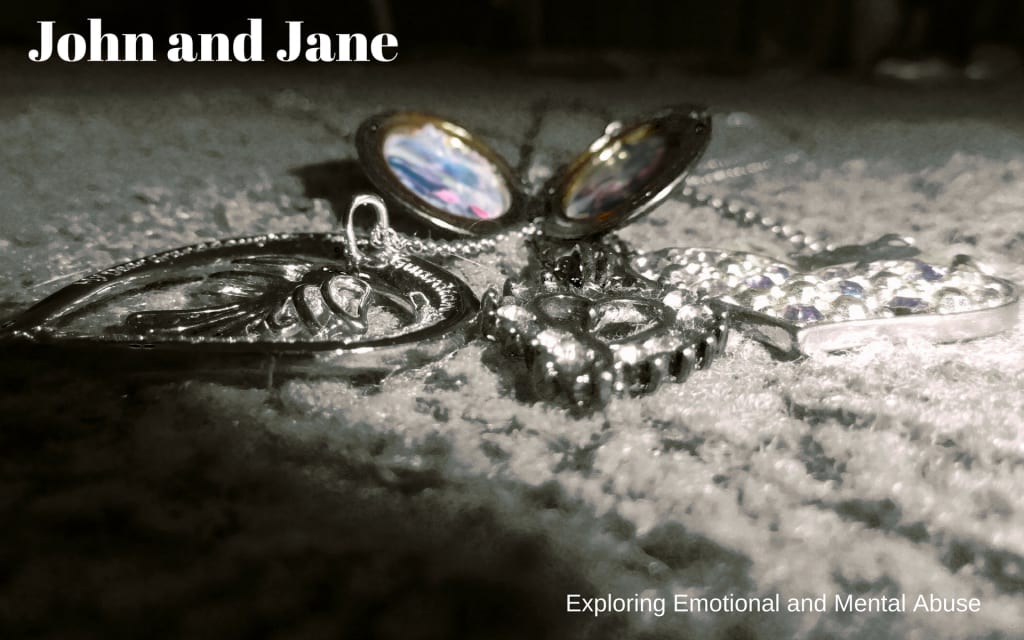John and Jane
Exploring Emotional and Mental Abuse

As a creative writer, I tend to take a different approach to analyzing everyday situations. The following article is an example of this. It introduces two characters and scenes from their life in order to demonstrate a current societal plague.
Below are descriptions of two characters, individuals that make up one relationship.
Character One
- Name: John
- Significant Other: Jane
- Age: 27
- Hobbies: biking, video games, gambling, reading
- Occupation: Bartender
- Traits: humorous, intelligent, arrogant, charismatic
- Frequent saying: “I did not, you’re crazy” “Next week”
Character Two
- Name: Jane
- Significant Other: John
- Age: 25
- Hobbies: running, reading, gambling, frequent coffee drinker
- Occupation: Secretary
- Traits: Quiet, studious, responsible
- Frequent saying: “I’m sorry” “I thought you said you were going to be home”
No two relationships are the same. There are relationships that are beautiful, ones that are bland, and ones that are ugly. The two people that create it decide what elements they will include in their relationship; each brings a special trait to the pairing. One may bring their seriousness while another provides moments of intense light heartedness.
In some circumstances, however, negativity brought by one person spurs a desired negative reaction in the other. What you give you also receive. Mental and emotional abuse has recently been taking the spotlight in popular culture and the world of psychology.
Examples of it can be seen on numerous TV shows, novels (Twilight), and even presented in music. In everyday life, it can be found in school hallways, behind home doors, and within the workplace. It is something that is difficult to prove and sometimes even difficult to see as the victim is often taught to think “it’s just my fault” “it’s me.”
Too often the abused avoids even talking about it because it is something that is difficult to be seen and often it is looked at as something “not serious” and the person receiving the abuse is said to just be “too sensitive."
In other cases, the one initiating the emotional abuse can convince the victim that it is, in fact, their fault, they are convincing enough to make their partner question what they thought to be true.
An Example with John And Jane
John and Jane have been dating for four years. They have had time to get to know each other and have lived together for the past year. For their anniversary Jane planned a dinner, giving John a fair amount of warning so that he would be free. She left work and went straight to the restaurant while he left work and went to the casino with a group of friends without telling her. She waited for a few hours before returning home to an empty house. When he arrived home the next morning and she questioned him saying: “I told you two weeks ago.” He responded with “No you didn’t. Why are you being so dramatic about this? You’re acting crazy.”
In this situation, John used words to spin her emotions and make her question events that she knew to be true. She knew she had told him despite his denial, but his words made her begin to wonder if she really did give him a warning. By using words like “dramatic” and “crazy” he begins the task of making her downplay her emotions to avoid future confrontation.
When events such as the one above continue, the victim begins to question the rationale behind their emotions and will begin to lack confidence in themselves. Anxiety will become a constant trait whenever emotions are concerned. Communication is not a strong trait in relationships like the one mentioned, the partners are never fully honest with each other and the abuser will often use their words to maintain or gain control over the abused.
Another Example with Jane And John
Jane spent the weekend alone while John said he was out with friends. She ignored the strange charges to their credit card that showed he was actually a few towns over staying at a hotel and spending an irresponsible amount of money on beverages at a bar.
When he came home, she decided it was time to have a discussion with him because once he returned she found herself facing an unbearable anxiety attack. He brought a heaviness into the home that hadn’t been there while he was away.
Jane: “I want to talk to you.”
John responds with a sigh before setting down a video game controller. She turns off the television to make sure his attention is on her. “About what?”
Jane: I haven’t been happy lately.
John: Okay? So, do something about it.
Jane: I’m trying to by talking to you.
John: I have nothing to do with it.
Jane: You’ve been putting me down lately, calling me dramatic and everything.
John: Well that’s how you’ve been acting. Don’t act that way if you don’t want the truth. What am I supposed to say when you stress me out? It’s not my fault you’re unhappy, if you would just stop being so difficult this wouldn’t happen.
This example presents a scene in which the abuser tries to put blame off themselves onto the victim. This is a common occurrence and often causes the victim to doubt that there is an issue. If the victim continues to talk to the abuser about what is happening instead of seeking out help, they will not be able to move on or do away with the unhealthy aspects of their relationship.
Find Help
How can individuals in relationships like the one presented find help? Is there hope for their relationship? Well… maybe, but also maybe not. In most cases the answer probably resides in the latter category of "NO."
Discussion with the abuser will most likely lead to more mind spinning and second guessing for the abused and an increase in power for the dominator. However, if both parties wish to try and continue the relationship it is possible to go to couples counseling if both parties wish to be active. The individual facing the abuse can also go or find other ways to build their self-esteem (finding a space away from the abuser is a great first step).
Often, in order to escape an abusive relationship, the victim needs to build their self-esteem and find ways to believe that the things that are happening are not actually their fault. There are numerous websites and hotlines available for those that are facing abusive relationships.
Helpful Sites and Phone Numbers
If you're wondering if you're in an abusive relationship, go to the Stop Relationship Abuse site to read more. There are also multiple hotlines available if you need help. We suggest Hopeline, below.
Hopeline: (919) 231-4525
About the Creator
Katrina Thornley
Rhode Island based author and poetess with a love for nature and the written word. Works currently available include Arcadians: Lullaby in Nature, Arcadians: Wooden Mystics, 26 Brentwood Avenue & Other Tales, and Kings of Millburrow.






Comments
There are no comments for this story
Be the first to respond and start the conversation.